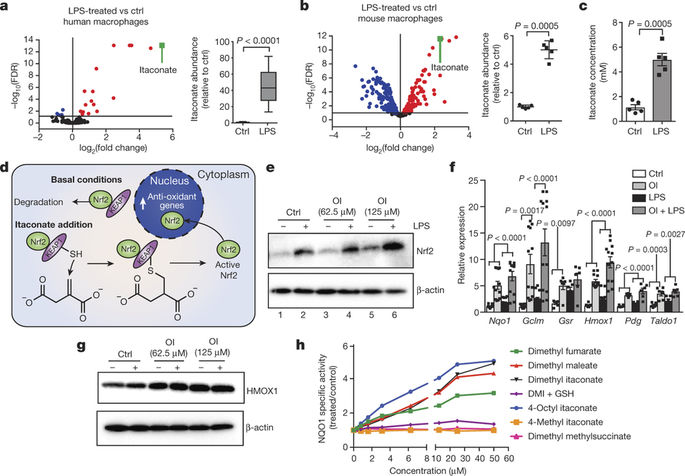Our official English website, www.x-mol.net, welcomes your feedback! (Note: you will need to create a separate account there.)
Itaconate is an anti-inflammatory metabolite that activates Nrf2 via alkylation of KEAP1
Nature ( IF 64.8 ) Pub Date : 2018-03-28 , DOI: 10.1038/nature25986 Evanna L Mills 1, 2, 3, 4 , Dylan G Ryan 1 , Hiran A Prag 5 , Dina Dikovskaya 6 , Deepthi Menon 1 , Zbigniew Zaslona 1 , Mark P Jedrychowski 2, 3 , Ana S H Costa 7 , Maureen Higgins 6 , Emily Hams 8 , John Szpyt 3 , Marah C Runtsch 1 , Martin S King 5 , Joanna F McGouran 9 , Roman Fischer 10 , Benedikt M Kessler 10 , Anne F McGettrick 1 , Mark M Hughes 1 , Richard G Carroll 1, 4 , Lee M Booty 4, 5 , Elena V Knatko 6 , Paul J Meakin 11 , Michael L J Ashford 11 , Louise K Modis 4 , Gino Brunori 12 , Daniel C Sévin 13 , Padraic G Fallon 8 , Stuart T Caldwell 14 , Edmund R S Kunji 5 , Edward T Chouchani 2, 3 , Christian Frezza 7 , Albena T Dinkova-Kostova 6, 15 , Richard C Hartley 14 , Michael P Murphy 5 , Luke A O'Neill 1, 4
Nature ( IF 64.8 ) Pub Date : 2018-03-28 , DOI: 10.1038/nature25986 Evanna L Mills 1, 2, 3, 4 , Dylan G Ryan 1 , Hiran A Prag 5 , Dina Dikovskaya 6 , Deepthi Menon 1 , Zbigniew Zaslona 1 , Mark P Jedrychowski 2, 3 , Ana S H Costa 7 , Maureen Higgins 6 , Emily Hams 8 , John Szpyt 3 , Marah C Runtsch 1 , Martin S King 5 , Joanna F McGouran 9 , Roman Fischer 10 , Benedikt M Kessler 10 , Anne F McGettrick 1 , Mark M Hughes 1 , Richard G Carroll 1, 4 , Lee M Booty 4, 5 , Elena V Knatko 6 , Paul J Meakin 11 , Michael L J Ashford 11 , Louise K Modis 4 , Gino Brunori 12 , Daniel C Sévin 13 , Padraic G Fallon 8 , Stuart T Caldwell 14 , Edmund R S Kunji 5 , Edward T Chouchani 2, 3 , Christian Frezza 7 , Albena T Dinkova-Kostova 6, 15 , Richard C Hartley 14 , Michael P Murphy 5 , Luke A O'Neill 1, 4
Affiliation

|
The endogenous metabolite itaconate has recently emerged as a regulator of macrophage function, but its precise mechanism of action remains poorly understood. Here we show that itaconate is required for the activation of the anti-inflammatory transcription factor Nrf2 (also known as NFE2L2) by lipopolysaccharide in mouse and human macrophages. We find that itaconate directly modifies proteins via alkylation of cysteine residues. Itaconate alkylates cysteine residues 151, 257, 288, 273 and 297 on the protein KEAP1, enabling Nrf2 to increase the expression of downstream genes with anti-oxidant and anti-inflammatory capacities. The activation of Nrf2 is required for the anti-inflammatory action of itaconate. We describe the use of a new cell-permeable itaconate derivative, 4-octyl itaconate, which is protective against lipopolysaccharide-induced lethality in vivo and decreases cytokine production. We show that type I interferons boost the expression of Irg1 (also known as Acod1) and itaconate production. Furthermore, we find that itaconate production limits the type I interferon response, indicating a negative feedback loop that involves interferons and itaconate. Our findings demonstrate that itaconate is a crucial anti-inflammatory metabolite that acts via Nrf2 to limit inflammation and modulate type I interferons.
中文翻译:

衣康酸盐是一种抗炎代谢物,可通过 KEAP1 的烷基化激活 Nrf2
内源性代谢物衣康酸盐最近作为巨噬细胞功能的调节剂出现,但其确切的作用机制仍知之甚少。在这里,我们表明衣康酸是小鼠和人类巨噬细胞中脂多糖激活抗炎转录因子 Nrf2(也称为 NFE2L2)所必需的。我们发现衣康酸盐通过半胱氨酸残基的烷基化直接修饰蛋白质。衣康酸酯使 KEAP1 蛋白上的半胱氨酸残基 151、257、288、273 和 297 烷基化,使 Nrf2 能够增加具有抗氧化和抗炎能力的下游基因的表达。衣康酸盐的抗炎作用需要激活 Nrf2。我们描述了一种新的细胞渗透性衣康酸酯衍生物,4-辛基衣康酸酯的使用,它在体内可防止脂多糖诱导的致死性并减少细胞因子的产生。我们表明 I 型干扰素可促进 Irg1(也称为 Acod1)的表达和衣康酸的产生。此外,我们发现衣康酸盐的产生限制了 I 型干扰素的反应,表明涉及干扰素和衣康酸盐的负反馈回路。我们的研究结果表明,衣康酸盐是一种重要的抗炎代谢物,它通过 Nrf2 发挥作用以限制炎症和调节 I 型干扰素。
更新日期:2018-03-28
中文翻译:

衣康酸盐是一种抗炎代谢物,可通过 KEAP1 的烷基化激活 Nrf2
内源性代谢物衣康酸盐最近作为巨噬细胞功能的调节剂出现,但其确切的作用机制仍知之甚少。在这里,我们表明衣康酸是小鼠和人类巨噬细胞中脂多糖激活抗炎转录因子 Nrf2(也称为 NFE2L2)所必需的。我们发现衣康酸盐通过半胱氨酸残基的烷基化直接修饰蛋白质。衣康酸酯使 KEAP1 蛋白上的半胱氨酸残基 151、257、288、273 和 297 烷基化,使 Nrf2 能够增加具有抗氧化和抗炎能力的下游基因的表达。衣康酸盐的抗炎作用需要激活 Nrf2。我们描述了一种新的细胞渗透性衣康酸酯衍生物,4-辛基衣康酸酯的使用,它在体内可防止脂多糖诱导的致死性并减少细胞因子的产生。我们表明 I 型干扰素可促进 Irg1(也称为 Acod1)的表达和衣康酸的产生。此外,我们发现衣康酸盐的产生限制了 I 型干扰素的反应,表明涉及干扰素和衣康酸盐的负反馈回路。我们的研究结果表明,衣康酸盐是一种重要的抗炎代谢物,它通过 Nrf2 发挥作用以限制炎症和调节 I 型干扰素。



























 京公网安备 11010802027423号
京公网安备 11010802027423号